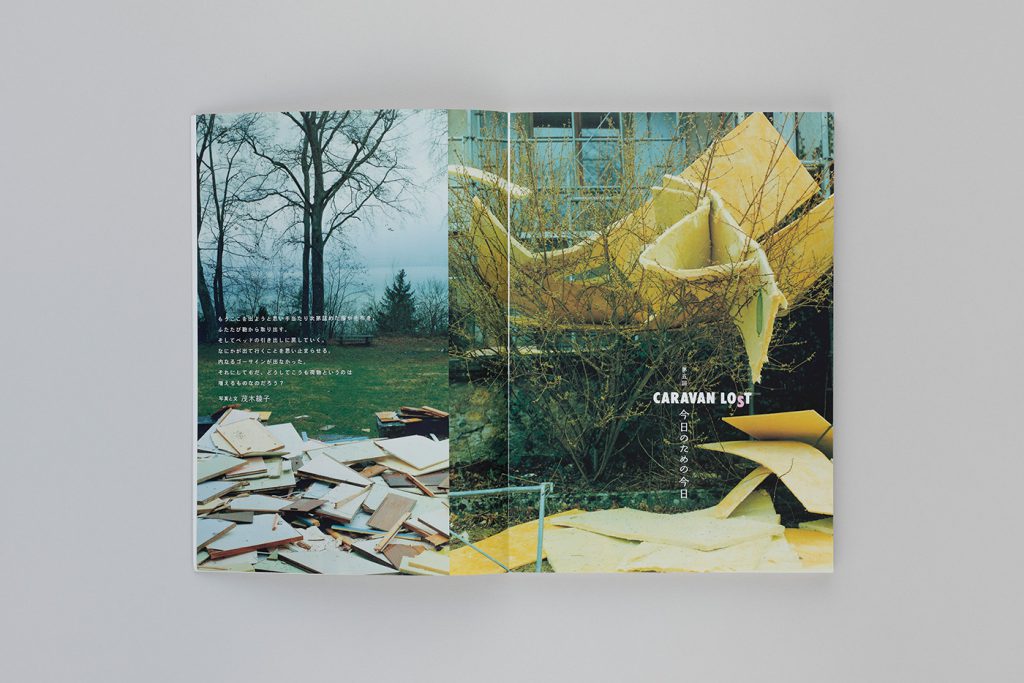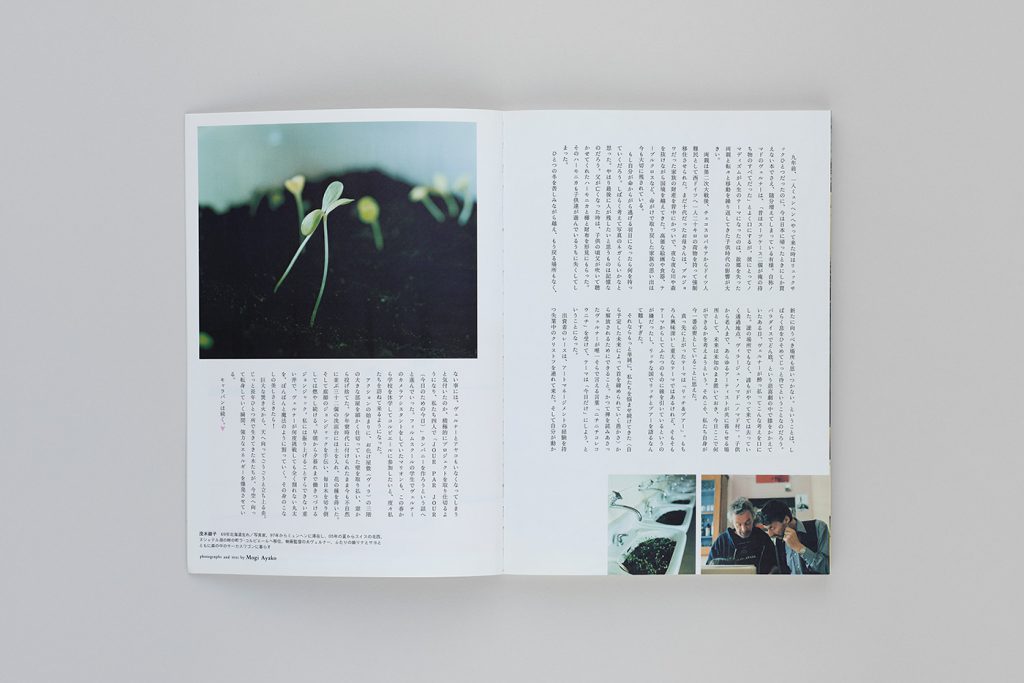

写真と文=茂木綾子
もうここを出ようと思い手当たり次第詰めた服や毛布を、ふたたび鞄から取り出す。そしてベッドの引き出しに戻していく。なにかが出て行くことを思いとどまらせる。内なるゴーサインが出なかった。それにしてもだ、どうしてこうも荷物というのは増えるものなのだろう?
9年前、ひとりミュンヘンへやって来た時はリュックサックひとつだったのに、今は日本に帰ったときにしか買えない本でさえ、随分増えてしまっている有様。自称ノマドのヴェルナーは、「昔はスーツケース2個が俺の持ち物のすべてだった」とよく口にするが、彼にとってノマディズムが人生のテーマになったのは、故郷を失った両親と転々と移動を繰り返してきた子ども時代の影響が大きい。
両親は第二次大戦後、チェコスロバキアからドイツ人難民として西ドイツへひとり20キロの荷物を持って強制移住させられた。まだ十代だったお母さんは、ブルジョワだった家族の財産を背中にかついで、夜な夜な川や森を抜けながら国境を越えてきた。高価な絵画や食器、テーブルクロスなど、命がけで取り戻した家族の思い出は今も大切に残されている。
もし自分が命からがら逃げる羽目になったら何を持っていくだろう。しばらく考えて写真のネガくらいかなと思った。やはり最後に人が残したいと思うものは記憶なのだろう。父が亡くなった時は、子どもの頃、父が吹いて聴かせてくれたハーモニカと櫛と財布を形見にもらった。そのハーモニカも子どもたちが遊んでいるうちに失くしてしまった。
ひとつの冬を苦しみながら越え、もう戻る場所もなく新たに向かうべき場所も思いつかない。ということは、しばらく息をひそめてじっと待てということなのだろう。パラダイスでどん底、という悲喜劇の中で膝をかかえていたある日、ヴェルナーが酔っ払ってこんな考えを口にした。誰の場所でもなく、誰もがやって来ては去っていく通過地点、ヴィラージュ・ノマド(ノマド村)。子どもから老人まで、あらゆるアーティストが共に暮らせる場所として、未来は未知のまま置いておき、今日ここで何ができるかを考えようという。それこそ私たち自身が今一番必要としていることに思えた。
真っ先に上がったテーマは「リッチ&プアー」。もちろん興味深いし重大なテーマではあるけれど、そもそもテーマからしてふたつのものに線を引いているというのが嫌だったし、リッチな国でリッチとプアーを語るなんて難しすぎた。
それならもっと単純に、私たちを悩ませ続けてきた〈自ら予定した未来によって首を締められていく愚かさ〉から解放されるためにできること。かつて禅を読みあさったヴェルナーが唯一そらで言える言葉「ニチニチコレコウニチ」を受けて、テーマは「今日だけ」にしよう、ということになった。
出資者のレースは、アートマネージメントの経験を持つ失業中のクリストフを連れて来た。そして自分が動かないことには、ヴェルナーとアヤコもいなくなってしまうと気づいたのか。積極的にプロジェクトを取り仕切るようになり、私たち4人で「Jour par Jour(今日のための今日)」カンパニーを作ろうという話へと進んでいった。フィルムスクールの学生でヴェルナーのカメラアシスタントをしていたマリオンも、この春から学校を休学してコルビエールに参加したいと、たびたび私たちを訪ねて来るようになった。
アクションの始まりに、お化け屋敷(ヴィラ)の3階の大きな部屋を細かく仕切っていた壁を取り払い、窓から投げて捨てた。少年寮時代に付けられたまま今も不自然に並ぶ32個の洗面台には土を入れ、花の種を蒔いた。そして庭師のジョンジャックを手伝い、毎日木を切り倒しては燃やし続ける。早朝から夕暮れまで働きつづけるジョンジャック。私には振り上げることすらできない重い斧で、ヴェルナーが何度挑戦してもまったく割れない丸太を、ぽんぽんと魔法のように割っていく。その身のこなしの美しさときたら!
巨大な焚き火から、天へ向かってごうごうと立ちのぼる炎。じっと長年ひとつ所で生きてきた木たちが、今空へ向かって転身していく瞬間、強力なエネルギーを爆発させている。
キャラバンは続く。
—
もうここを出ようと思い手当たり次第詰めた服や毛布を、ふたたび鞄から取り出す。そしてベッドの引き出しに戻していく。なにかが出て行くことを思いとどまらせる。内なるゴーサインが出なかった。それにしてもだ、どうしてこうも荷物というのは増えるものなのだろう?
9年前、ひとりミュンヘンへやって来た時はリュックサックひとつだったのに、今は日本に帰ったときにしか買えない本でさえ、随分増えてしまっている有様。自称ノマドのヴェルナーは、「昔はスーツケース2個が俺の持ち物のすべてだった」とよく口にするが、彼にとってノマディズムが人生のテーマになったのは、故郷を失った両親と転々と移動を繰り返してきた子ども時代の影響が大きい。
両親は第二次大戦後、チェコスロバキアからドイツ人難民として西ドイツへひとり20キロの荷物を持って強制移住させられた。まだ十代だったお母さんは、ブルジョワだった家族の財産を背中にかついで、夜な夜な川や森を抜けながら国境を越えてきた。高価な絵画や食器、テーブルクロスなど、命がけで取り戻した家族の思い出は今も大切に残されている。
もし自分が命からがら逃げる羽目になったら何を持っていくだろう。しばらく考えて写真のネガくらいかなと思った。やはり最後に人が残したいと思うものは記憶なのだろう。父が亡くなった時は、子どもの頃、父が吹いて聴かせてくれたハーモニカと櫛と財布を形見にもらった。そのハーモニカも子どもたちが遊んでいるうちに失くしてしまった。
ひとつの冬を苦しみながら越え、もう戻る場所もなく新たに向かうべき場所も思いつかない。ということは、しばらく息をひそめてじっと待てということなのだろう。パラダイスでどん底、という悲喜劇の中で膝をかかえていたある日、ヴェルナーが酔っ払ってこんな考えを口にした。誰の場所でもなく、誰もがやって来ては去っていく通過地点、ヴィラージュ・ノマド(ノマド村)。子どもから老人まで、あらゆるアーティストが共に暮らせる場所として、未来は未知のまま置いておき、今日ここで何ができるかを考えようという。それこそ私たち自身が今一番必要としていることに思えた。
真っ先に上がったテーマは「リッチ&プアー」。もちろん興味深いし重大なテーマではあるけれど、そもそもテーマからしてふたつのものに線を引いているというのが嫌だったし、リッチな国でリッチとプアーを語るなんて難しすぎた。
それならもっと単純に、私たちを悩ませ続けてきた〈自ら予定した未来によって首を締められていく愚かさ〉から解放されるためにできること。かつて禅を読みあさったヴェルナーが唯一そらで言える言葉「ニチニチコレコウニチ」を受けて、テーマは「今日だけ」にしよう、ということになった。
出資者のレースは、アートマネージメントの経験を持つ失業中のクリストフを連れて来た。そして自分が動かないことには、ヴェルナーとアヤコもいなくなってしまうと気づいたのか。積極的にプロジェクトを取り仕切るようになり、私たち4人で「Jour par Jour(今日のための今日)」カンパニーを作ろうという話へと進んでいった。フィルムスクールの学生でヴェルナーのカメラアシスタントをしていたマリオンも、この春から学校を休学してコルビエールに参加したいと、たびたび私たちを訪ねて来るようになった。
アクションの始まりに、お化け屋敷(ヴィラ)の3階の大きな部屋を細かく仕切っていた壁を取り払い、窓から投げて捨てた。少年寮時代に付けられたまま今も不自然に並ぶ32個の洗面台には土を入れ、花の種を蒔いた。そして庭師のジョンジャックを手伝い、毎日木を切り倒しては燃やし続ける。早朝から夕暮れまで働きつづけるジョンジャック。私には振り上げることすらできない重い斧で、ヴェルナーが何度挑戦してもまったく割れない丸太を、ぽんぽんと魔法のように割っていく。その身のこなしの美しさときたら!
巨大な焚き火から、天へ向かってごうごうと立ちのぼる炎。じっと長年ひとつ所で生きてきた木たちが、今空へ向かって転身していく瞬間、強力なエネルギーを爆発させている。
キャラバンは続く。
—
photographs & text by Ayako Mogi
I took out the clothes and blankets that I had randomly packed to leave this place, and took them out of my bag again. I put them back in my bed drawer. Something discouraged me from leaving. I couldn’t get the inner go-ahead. But why does my luggage keep growing?
Nine years ago, when I came to Munich alone, I had only one backpack, and now I have so much more, even books that I can only buy when I go back to Japan. Werner, a self-proclaimed nomad, often says, “Two suitcases used to be all I had.” For him, nomadism became the theme of his life because of his parents’ loss of their hometown and his childhood of moving from place to place.
After World War II, his parents were forced to move from Czechoslovakia to West Germany as German refugees, each carrying 20 kilograms of luggage. Her mother, still in her teens, carried the family’s bourgeois possessions on her back and crossed the border at night through rivers and forests. The expensive paintings, tableware, tablecloths, and other memories of the family that she risked her life to retrieve are still treasured today.
If I had to flee for my life, what would I take with me? After thinking about it for a while, I realized that I would probably take the negatives of my photos. After all, the last thing people want to leave behind is their memories. When my father passed away, he gave me a harmonica, a comb, and a wallet as a memento of the harmonica he used to play for me when I was a child. I lost the harmonica while the children were playing with it.
After suffering through one winter, I have no place to return to and no idea where I should go again. I guess that means I have to wait and breathe for a while. One day, while I was knee-deep in the tragicomedy of bottoming out in paradise, Werner drunkenly mentioned this thought to me. The Villages Nomades (Nomadic Villages) are places where no one belongs, but where everyone comes and goes. A place where artists of all kinds, from children to the elderly, can live together, leaving the future unknown, and thinking about what we can do here today. It seemed to me that this was exactly what we ourselves needed right now.
The first theme that came up was “Rich and Poor”. Of course it was an interesting and important topic, but I didn’t like the idea of drawing a line between the two in the first place, and it was too difficult to talk about the rich and the poor in a rich country.
It was too difficult to talk about the rich and the poor in a rich country. Then I thought of something simpler, something we could do to free ourselves from the folly of being strangled by the future we have planned. Werner, who used to read a lot of Zen books, could only say “Nichinichi korekou nichi” in his own words, so we decided to use “only today” as the theme.
Race, the investor, brought along Christoph, an unemployed man with experience in art management. And he realized that if he didn’t make a move, Werner and Ayako would be gone, too. He began to actively take charge of the project, and the four of us began to talk about creating a “Jour par Jour” (today for today) company. Marion, a film school student and Werner’s camera assistant, came to visit us often this spring, asking to take a leave of absence from school to join Corbières.
At the beginning of the action, we took down the wall that had divided the large room on the third floor of the haunted house (villa) and threw it out the window. The thirty-two washbasins, still unnaturally lined up as they were in the boys’ dormitory, were filled with soil and sown with flower seeds. He helped John Jack, the gardener, cut down and burned trees every day. John Jack works from early morning until dusk. With his heavy axe, which I could not even lift, he magically chopped down logs that Werner could not break no matter how many times he tried. The beauty of his body language!
The flames from the huge bonfire were roaring up to the sky. Trees that have lived in one place for many years are now exploding with powerful energy as they take to the sky.
Our caravan goes on.
I took out the clothes and blankets that I had randomly packed to leave this place, and took them out of my bag again. I put them back in my bed drawer. Something discouraged me from leaving. I couldn’t get the inner go-ahead. But why does my luggage keep growing?
Nine years ago, when I came to Munich alone, I had only one backpack, and now I have so much more, even books that I can only buy when I go back to Japan. Werner, a self-proclaimed nomad, often says, “Two suitcases used to be all I had.” For him, nomadism became the theme of his life because of his parents’ loss of their hometown and his childhood of moving from place to place.
After World War II, his parents were forced to move from Czechoslovakia to West Germany as German refugees, each carrying 20 kilograms of luggage. Her mother, still in her teens, carried the family’s bourgeois possessions on her back and crossed the border at night through rivers and forests. The expensive paintings, tableware, tablecloths, and other memories of the family that she risked her life to retrieve are still treasured today.
If I had to flee for my life, what would I take with me? After thinking about it for a while, I realized that I would probably take the negatives of my photos. After all, the last thing people want to leave behind is their memories. When my father passed away, he gave me a harmonica, a comb, and a wallet as a memento of the harmonica he used to play for me when I was a child. I lost the harmonica while the children were playing with it.
After suffering through one winter, I have no place to return to and no idea where I should go again. I guess that means I have to wait and breathe for a while. One day, while I was knee-deep in the tragicomedy of bottoming out in paradise, Werner drunkenly mentioned this thought to me. The Villages Nomades (Nomadic Villages) are places where no one belongs, but where everyone comes and goes. A place where artists of all kinds, from children to the elderly, can live together, leaving the future unknown, and thinking about what we can do here today. It seemed to me that this was exactly what we ourselves needed right now.
The first theme that came up was “Rich and Poor”. Of course it was an interesting and important topic, but I didn’t like the idea of drawing a line between the two in the first place, and it was too difficult to talk about the rich and the poor in a rich country.
It was too difficult to talk about the rich and the poor in a rich country. Then I thought of something simpler, something we could do to free ourselves from the folly of being strangled by the future we have planned. Werner, who used to read a lot of Zen books, could only say “Nichinichi korekou nichi” in his own words, so we decided to use “only today” as the theme.
Race, the investor, brought along Christoph, an unemployed man with experience in art management. And he realized that if he didn’t make a move, Werner and Ayako would be gone, too. He began to actively take charge of the project, and the four of us began to talk about creating a “Jour par Jour” (today for today) company. Marion, a film school student and Werner’s camera assistant, came to visit us often this spring, asking to take a leave of absence from school to join Corbières.
At the beginning of the action, we took down the wall that had divided the large room on the third floor of the haunted house (villa) and threw it out the window. The thirty-two washbasins, still unnaturally lined up as they were in the boys’ dormitory, were filled with soil and sown with flower seeds. He helped John Jack, the gardener, cut down and burned trees every day. John Jack works from early morning until dusk. With his heavy axe, which I could not even lift, he magically chopped down logs that Werner could not break no matter how many times he tried. The beauty of his body language!
The flames from the huge bonfire were roaring up to the sky. Trees that have lived in one place for many years are now exploding with powerful energy as they take to the sky.
Our caravan goes on.